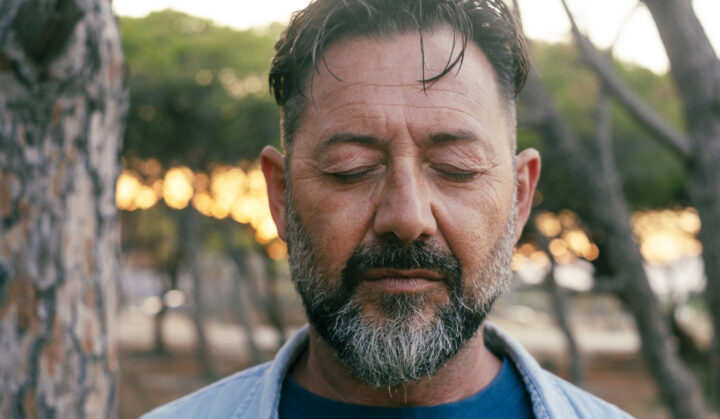There comes a time when the usual routines start to feel pointless, even if nothing is exactly going wrong.

You go through the motions, but nothing lands. Happiness feels like a foreign concept, effort feels heavy, and everything blurs into this foggy “meh.” If you’ve been wondering whether you’re just tired, or actually questioning everything, here are some glaring signs you’ve hit that quiet, creeping “What’s the point?” phase of life. It doesn’t have to be this way, and if you’re truly struggling, don’t hesitate to reach out to someone you trust, or even a professional, for help.
1. You stop making plans for the future.

You used to think ahead—holidays, career moves, home ideas, even small weekend plans. Now? You barely want to commit to next week. The idea of picturing anything long-term feels exhausting or completely pointless. It’s not that you don’t care—it’s that imagining the future feels like staring into static. When you’re in this phase, even good things ahead feel emotionally out of reach.
2. You’re not excited, even when things go right.

Things work out… and you feel nothing. The job comes through, the plans fall into place, someone gives you praise, and your first reaction is just a quiet nod. No buzz. No warmth. Just, “Alright then.” That sense of emotional flatness can creep in so slowly you don’t notice it at first. However, eventually, even the highs feel muted. You want to care; you just don’t feel it in your body anymore.
3. You do everything on autopilot.

Your days are a blur of tasks and habits, but none of them feel like they’re connected to anything bigger. You eat, scroll, answer messages, tick boxes, but it’s all muscle memory at this point. There’s no sense of real engagement. It’s like you’re watching yourself from a distance, doing what you’re “supposed” to do without feeling like you’re really part of it.
4. You struggle to answer the question, “How are you?”

Because honestly? You don’t know. You’re not great, but you’re not awful. You’re just… here. Existing. Fine enough to function, but not enough to feel truly alive. Saying “I’m okay” feels like a lie, but saying “not good” feels too dramatic. That emotional limbo is common during this phase. It’s not full-blown crisis, but it’s definitely not contentment either. And that weird in-between makes it hard to explain to anyone else, or even to yourself.
5. Everything feels like a massive effort.

Simple things—replying to a message, doing laundry, brushing your teeth—start to feel heavier than they should. You still do them, mostly, but it takes more out of you than it used to. When life starts feeling like one long to-do list with no reward at the end, motivation naturally crumbles. It’s not laziness. It’s emotional depletion dressed up as disinterest.
6. You’re more numb than sad.

You’re not crying every day or lying in bed all the time—you’re just not feeling much at all. There’s a kind of emotional flatness that settles in where joy used to live, and even sadness feels too far away to fully reach. That kind of numbness is hard to spot from the outside. You might seem “fine” to everyone else, but inside, you’re quietly wondering what it would take to feel anything deeply again.
7. You’ve lost interest in the things that used to ground you.

Music doesn’t hit the same. Books feel hard to focus on. Your favourite TV shows feel background-y. Even the hobbies that used to lift you up now feel like just another task to force yourself through. When you hit this stage, it’s less about disliking things and more about struggling to connect. You still remember what used to bring you joy—you just can’t seem to tap into it right now.
8. You overthink everything, but nothing changes.

You’re constantly in your head—replaying conversations, questioning your decisions, trying to “figure things out.” Unfortunately, none of it leads to clarity. It just loops. And you still end up doing the same things, feeling the same way. That kind of circular overthinking is a hallmark of emotional burnout. Your brain’s trying to solve a problem that isn’t logistical—it’s existential. That’s why it never leads anywhere satisfying.
9. You feel guilty for feeling this way.

On paper, maybe your life doesn’t look bad. You might have a stable job, a roof over your head, people who care. And yet, you feel hollow, and that hollowness makes you feel ashamed, like you’re ungrateful or weak for struggling. Of course, guilt doesn’t fix the emptiness—it just buries it deeper. Feeling lost or emotionally disconnected doesn’t mean you’re failing. It means something deeper is asking to be noticed.
10. You fantasise about disappearing—not dying, just… vanishing.

It’s not about wanting to harm yourself—it’s more like wishing you could pause everything. Disappear into a cabin in the woods. Sleep for three months. Leave without explanation and come back when it all feels lighter. This is a sign your system is overwhelmed. You’re not lazy or antisocial; you’re craving space from the constant pressure to keep functioning like nothing’s wrong.
11. You feel disconnected from yourself.

Somewhere along the way, you stopped checking in with how you actually feel. You’ve become more reactive than reflective. You move through life on default, and when you finally stop to ask what you want or need, you draw a blank. Emotional disconnection is subtle but powerful. It’s like walking around in shoes that almost fit, but never quite feel like yours. You’re not sure where “you” went, but you miss that version of yourself.
12. You avoid things that used to give you a sense of progress.

Even basic things like setting goals, journaling, or making plans feel pointless now. You used to track progress or set intentions, but now it just feels like pretending to care when deep down, you don’t. When you’re in this space, hope feels fake. And rather than disappoint yourself again, you quietly stop aiming for anything at all. It’s a form of self-protection, but one that slowly builds its own cage.
13. You crave meaning but don’t know where to find it.

You want something deeper—a spark, a purpose, something that makes it all feel worthwhile. But every time you try to find it, you either get overwhelmed, disillusioned, or just more confused. This yearning is a quiet ache that doesn’t go away with distractions. You’re not just bored—you’re spiritually underfed. Until that part of you is acknowledged, nothing else really satisfies.
14. You’ve started asking yourself, “Is this it?”

That question doesn’t always come with drama—it shows up in the still moments. Washing the dishes. Lying in bed. Walking home from work. It sneaks in quietly and lingers: Is this really all there is? That’s not you being ungrateful. It’s a sign you’re ready for something to change. You’re starting to want more, not in a material sense, but in a way that makes you feel alive again. And that’s not the end of the road. It’s the beginning of a better question.




